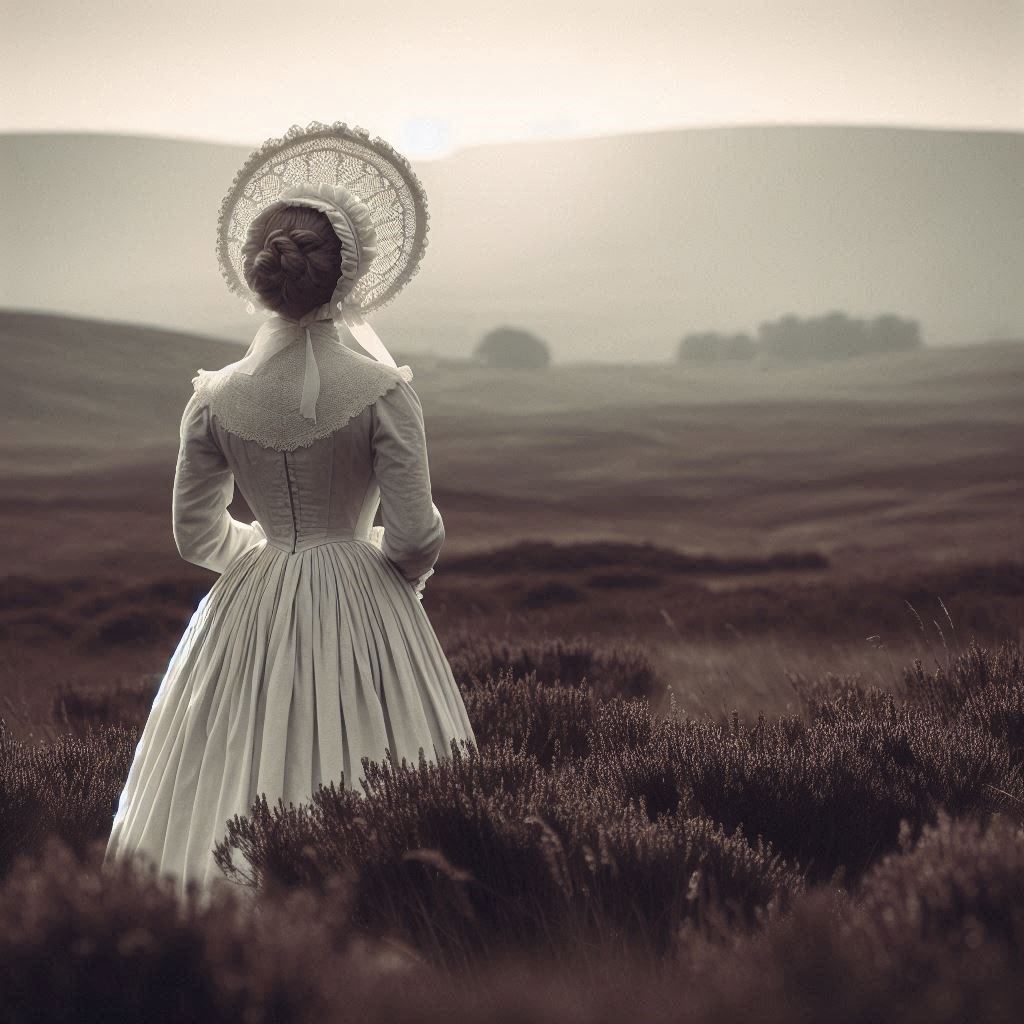The Woman in White is a novel about love, fear, conspiracy, and intrigue. Set in 1850 and first published as a serial between 1859 and 1860, Wilkie Collins’ book depicts the story of a cast of characters involved in a conspiracy to steal a young heiress’ fortune.
The story revolves around the lives of three women. Laura Fairlie is the innocent and naïve heiress, Anne Catherick is her unfortunate doppelgänger, and Marian Halcombe is her half-sister. Though these women form the backbone of the narrative, the story is opened and concluded by the testimony of Walter Hartright. A young drawing master who initially takes a job as Laura and Marian’s teacher, Hartright falls in love with the former half-sister and devotes himself to her protection against the untoward activities of her husband and his accomplice.
This article will explore the role of Laura in The Woman in White. At first under the guardianship of her uncle and half-sister, then trapped in an oppressive marriage, before finally having her affairs dictated by her new husband-to-be, Laura is a prisoner in her own life. Each of these phases of Laura’s life will be discussed in turn below.
Frederick Fairlie & Marian Halcombe
Laura Fairlie’s parents passed away some time before the beginning of the story. With a £20,000 inheritance to her name, Laura spent the rest of her upbringing under the guardianship of her ailing and reclusive uncle, Frederick Fairlie. It is Marian, however, who bore the majority of the burden of looking after Laura during her youth.
Marian acts like a surrogate mother for Laura throughout their youth. She intervenes at a particularly important moment in Laura’s life. This is when Laura has the choice to trigger her withdrawal from the marriage arrangement with Percival, with the possibility of marrying the man she loves in Walter Hartright. Marian arranges an interview with Walter and steers him away from Laura, directing him to leave Limmeridge House owing to his improper, if innocent, attraction to Laura.
At the same time, Marian encourages her half-sister to continue with her marriage to Percival as planned. As the personification of the rules of propriety of her era, Marian enforces the materialistic notion that what is best for Laura, her genuine goal, is to attain the highest rank and fortune available to her. Marian discourages marriage for love. To her, it is a frivolous excess that obstructs the proper route to high standing in Victorian England.
From Limmeridge House to Blackwater Park, Laura is confined within the walls of Victorian social norms.

With the aim of acting with unimpeachable etiquette, Laura surrenders control of her marriage arrangement to Percival. She confesses to Percival her love for another man, though she does not say who, and says that it is up to him to decide whether to continue with the marriage or break it off. Expecting her decorum to be reciprocated, for Percival to break off the engagement and thank her for her honesty, Laura is crushed when he replies that he still intends to marry her.
At the one moment when Laura has authority of her own to break off the marriage agreement she does not wish to fulfil, she inexplicably surrenders control. With the pressures of social etiquette dictating her every movement, Laura exposes a weakness to the insidious false baronet. He seizes this weakness with abandon, having only feigned any romantic interest he had shown towards Laura up to this point. In fact, as events reveal, even mere decency was something artificial for Percival Glyde.
Sir Percival Glyde & Count Fosco
Sir Percival Glyde is indeed not Sir Percival Glyde, but an imposter who assumed the identity to usurp the estate of a deceased baronet. Count Fosco is a flamboyant Italian gentleman who attached himself to Sir Percival by friendship after the fraudster saved his life. As is revealed towards the end of the novel, Fosco is also a disgraced and traitorous member of a revolutionary group of political assassins referred to only as the Brotherhood. Both men are scandalously duplicitous. Lies and deceit are at the bedrock of their character.
A revelation is made shortly after Laura and Marian move to Blackwater Park, Percival Glyde’s estate. Percival did not marry Laura for love or even affection. Instead, he saw the fortune Laura had inherited as an opportunity to pay off his overwhelming debts. Fosco, in similar financial difficulty, is more than a complicit partner. He is the mastermind behind the plot, working hard to control Percival’s temper and impatience.

You might like our article on Guilt and the Powerful Lessons of the Brothers Karamazov
The situation at Blackwater Park is obviously exploitative and manipulative. Percival and Fosco try to force Laura to sign away her fortune, placing a document in front of her to sign without allowing her to read it or consult her solicitor. When Marian falls ill, they hide her in a secluded part of the house. They tell Laura that her half-sister has returned to Cumbria. Laura is whisked away to London, apparently en route to join her sister. In the capital, she and her doppelgänger Anne Catherick, who has been taken captive, are made to swap places by Fosco. Catherick dies and Laura is interred in a mental asylum under her name.
The overt manipulation that Laura is subject to at the hands of her husband and his accomplice are unambiguously awful. In her short and ill-fated marriage, Laura is manoeuvred against her will and against her interests to the designs of these conspirators. When she finally escapes from the asylum with the help of Marian, the trajectory of Laura’s life dramatically improves, or so it seems.
Walter Hartright & Marian Halcombe
Walter Hartright is from a modest background. Like Laura, he is directly attributed with very little in the way of personal flaws. He is a humble drawing teacher who we witness innocently fall in love, only to be caught up in a world of danger and deceit that almost costs him his life. Walter is absent from the work between his exit from Limmeridge House and his return from a dangerous archaeological expedition to South America. Having had his feelings for Laura quashed by Marian and falling under the surveillance of Percival, Walter takes a position on this expedition to flee the country and his troubles.
When he returns, he hears of Laura’s false death. He heads to Cumbria to pay his respects at her grave, where he comes across real Marian and a very much alive Laura. From then on he dedicates his life to restoring her to her proper station in life.
There is a taste of tragedy in the fact that even when she has escaped the tyranny of her oppressive, uncaring, and exploitative husband, Laura is still a passenger in her own life. No longer under the tyranny of Percival and Fosco, Laura passes into the guardianship of Walter and Marian. The intent of the control has changed, but in effect it has not. Laura is no more in control of her life after her marriage with Percival than she was during it.

Walter takes responsibility for managing the affairs of the two half-sisters. They take up residence in a crowded district of London and Walter pays for their expenses by flogging water colour paintings. Laura starts to become aware of the fact that she is not involved in any of the important decisions being made about her and her future. In their benevolent deception, Walter and Marian pretend to commission Laura to produce drawings for sale. Her paintings are not up to marketable standards, so Walter hides them in his room and takes money out of his own earnings to give to Laura.
Desperate to help those who care for her, Laura is unknowingly deceived into a child-like pretence. Marian and Walter are so convinced that Laura is utterly incapable of providing anything useful to their situation that they create an elaborate infantilising lie to keep her in a false state of ignorant satisfaction.
It is Walter who visits Laura’s solicitor to begin the legal proceedings of proving her identity. It is Walter who, alone, travels to Blackwater Park to investigate Percival’s scandalous background. It is he who confronts Fosco and, through a carefully constructed threat to his life, drives him out of the country. Even when she is freed from her original oppressors, Laura is completely at the mercy of others.
Conclusion
Laura is the victim of a patriarchal society that demanded marriage, servility, and the abandonment of all personal interest from women. This system is unfortunately enforced by her half-sister, Marian, who forbids her to marry for love, driving away the man for whom she felt genuine affection. Wilkis Collins clearly illustrates the oppressive nature of Laura’s marriage to Percival, but the meaning of his depiction of Laura’s relationship with Walter in the later acts of the work. It is possible that, since criticising the institution of marriage was liberal enough for Collins’ era, the later acts of the work are a relapse to a simple hero and damsel in distress trope.
However, there is reason to believe that there is a more subtly conveyed message about the exploitative nature of hetero-normative relationship norms. Collins’ narrative technique of shifting between the first-person accounts by different characters naturally tends towards an increased focus on the narrating character. However, the balance feels as though it has lost its way after Walter’s return.
At no point in the work is Laura permitted to narrate the events of her own life. After Walter’s return, we do not even hear from Marian. The final act of the work, which depicts Walter’s heroism as he finally saves Laura from Fosco (Percival having accidentally immolated himself in a church in Hampshire), is dominated by the simple art teacher. The lasting taste of The Woman in White is that, no matter what she does, Laura is a passenger in her own life. Whether in a mansion in Limmeridge House, Blackwater Park, or a hovel in London, Laura is a prisoner.
Images generated by Bing Image Creator by Designer.




preman69 preman69 preman69
you are in reality a good webmaster. The website loading speed
is incredible. It sort of feels that you’re doing any unique trick.
Also, The contents are masterwork. you have performed a
fantastic task on this topic!
nila88 nila88 nila88
Wow, that’s what I was exploring for, what a information! existing here at this website, thanks admin of this site.
woles togel woles togel woles togel
I was suggested this website by my cousin. I
am no longer positive whether this publish is written through him as nobody else understand such special approximately
my problem. You are incredible! Thanks!
Hi my loved one! I want to say that this article is awesome,
great written and include almost all significant infos.
I would like to look more posts like this .
Great delivery. Great arguments. Keep up the good spirit.
Hello there, I do think your site might be having internet browser compatibility issues.
When I look at your site in Safari, it looks fine however, if opening
in Internet Explorer, it’s got some overlapping issues.
I simply wanted to provide you with a quick heads up!
Other than that, fantastic blog!
After I originally left a comment I appear to have clicked the -Notify me when new comments are added- checkbox and now whenever a
comment is added I get 4 emails with the same comment.
Perhaps there is an easy method you are able to remove me from that service?
Kudos!
Hey there! I could have sworn I’ve been to this website before but after reading through some of the post
I realized it’s new to me. Anyways, I’m definitely delighted I found it and I’ll be book-marking and checking
back often!
Hey I am so grateful I found your blog page, I really found you by mistake, while I was looking on Bing for something else, Anyhow I am here now and would just like to say thanks for a incredible post and a all round enjoyable blog (I also love the theme/design), I don抰 have time to go through it all at the minute but I have bookmarked it and also added your RSS feeds, so when I have time I will be back to read more, Please do keep up the awesome job.
Hi there! This is kind of off topic but I need some help from an established blog. Is it difficult to set up your own blog? I’m not very techincal but I can figure things out pretty quick. I’m thinking about creating my own but I’m not sure where to begin. Do you have any ideas or suggestions? With thanks
Thanks for ones marvelous posting! I actually enjoyed reading it, you might be a great author.I will always bookmark your blog and may come back at some point.
I want to encourage that you continue your great
job, have a nice afternoon!
What i do not realize is actually how you’re not actually much more well-liked than you may be now. You’re very intelligent. You realize therefore significantly relating to this subject, produced me personally consider it from numerous varied angles. Its like men and women aren’t fascinated unless it is one thing to do with Lady gaga! Your own stuffs nice. Always maintain it up!
Piece of writing writing is also a excitement, if you be familiar with
after that you can write if not it is difficult to write.
It’s fantastic that you are getting ideas from this piece
of writing as well as from our dialogue made at this time.
Thank you for the good writeup. It in fact was a enjoyment account it.
Look advanced to more added agreeable from you!
By the way, how can we keep in touch?
Generally I do not read post on blogs, but I
would like to say that this write-up very compelled me to check out and do it!
Your writing style has been amazed me. Thank you, very great article.
Wonderful web site. Lots of useful information here.
I’m sending it to some buddies ans additionally sharing in delicious.
And of course, thanks in your effort!
Hello there! This post could not be written much better!
Going through this article reminds me of my previous roommate!
He constantly kept talking about this. I am going to forward this article to him.
Fairly certain he’s going to have a good read. Thanks for sharing!
Good web site! I truly love how it is easy on my eyes and the data are well written. I am wondering how I could be notified whenever a new post has been made. I’ve subscribed to your RSS which must do the trick! Have a nice day!